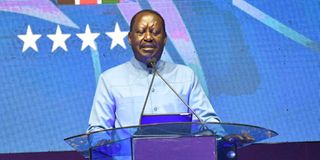Breaking News: At least 10 feared to have drowned in Makueni river
Raila Odinga’s ‘Mkombozi’ claim crumbled by historical facts caudit

Azimio la Umoja presidential candidate Raila Odinga.
I recently juxtaposed snapshots of the Azimio and Kenya Kwanza campaigns, offering an examination of respective animating reflexes and their underlying vibrations.
The pressing conundrum was presented by the opposing energies of the two main campaigns, with Kenya Kwanza appearing electrified, animated, inclusive, authentic and euphoric, whilst Azimio seemed lugubrious, workmanlike, regimented and unsettled.
It is clear that the energy in which a campaign resonates occurs in the field of encounter between the values that leaders espouse and their political performance.
For Kenya Kwanza, the energy is conjunctive, complementary and affirmative. For Azimio, the energy is disjunctive, zero-sum and contradictory.
The disjuncture in Azimio extends beyond a mere paucity of clarity, and is a direct corollary of a politics of self-righteousness bandied by the coalition with a shrill hypocrisy and spectacular deficiency of self-awareness.
The resultant dissonance registers on an astounding multiplicity of performative registers, plunging the campaign into cognitive disarray and inflaming nagging disquiet in followers and other audiences.
Broadly speaking, Azimio would like to define the impending election as a contest between them as good guys and Kenya Kwanza as the bad guys. They unctuously garland themselves as votaries of integrity while sanctimoniously attempting to profile their rivals as a deplorable pack of scoundrels.
Azimio also like to distinguish their ‘Second Liberation credentials’ in terms of their heroic exploits against the diabolical Kanu regime under Nyayo.
As a self-styled Mkombozi, Raila Odinga never wastes an opportunity to paint Kanu and Moi in a diabolical light as the most tyrannical kleptocracy ever to blight the annals of our history. Odinga’s running mate emphasises that only their ticket constitutes a credible anti-corruption platform, since it ostensibly comprises icons of integrity.
Odinga has always contested elections on the Second Liberation, Mkombozi, anti-Nyayo and anti-corruption ticket. At the same time, his coalitions for the past 15 years have been a veritable revolving door of former devils, present archangels, future fallen angels and devils.
In 2007, for instance, Musalia Mudavadi was his running-mate, and with William Ruto and Charity Ngilu a star Pentagon member in Odinga’s liberation foray. The dark side then had Martha Karua, Kalonzo Musyoka and Moses Wetang’ula, as well as Uhuru Kenyatta and Gideon Moi.
By 2013, Musyoka and Wetang’ula had been redeemed and were now champion liberators under the Cord banner, whilst Jubilee’s Ngilu, Kenyatta and Ruto were consigned beyond the pale.
In fact, Odinga could not make up his mind at that time whether Kenyatta and Ruto deserved to be locked up in Kamiti Maximum Security Prison, hanged by the neck or imprisoned in the Hague in the Netherlands. Karua, Mudavadi and Moi were foes of a lesser order, often obscured in Odinga’s political blindspot.
Come 2017, Musyoka, Mudavadi and Wetang’ula were now liberators in crusade against an obdurate UhuRuto pair, which had been joined by a ginger Ngilu and reticent Moi.
Karua remained defiant on her lone path, hardly disguising her disdain for either side.
For the 2022 contest, Kenyatta has been rehabilitated and with Moi as well as Ngilu, is now in the formidable super-Mkombozi league of the trophy acquisition, Karua.
Musyoka was ‘rescued’ from the cusp of abysmal oblivion in the nick of time.
Ruto is the new arch-nemesis, joined by newly fallen angels Mudavadi, Wetang’ula, Amason Kingi, Alfred Mutua and Justin B Muturi, who has defied the Kenyatta rehabilitation and struck out on his own.
If you have been following the vertiginously convoluted permutations and combinations of Odinga’s momentary confederates and nemeses, you will have noticed that there is neither rhyme nor reason to them.
Nothing rigidly anchors any player in Odinga’s political universe to a position. Neither ideology, ethic nor indeed any other principle can be applied to explain, predict or organise Odinga’s coalitional preferences. It follows, then, that Odinga’s normative designations of politicians as good or bad, reformer or corrupt and whatnot, is absolutely arbitrary and entirely bereft of underlying values.
By the same token, Azimio’s exuberant touting of the Second Liberation credentials, to wit, resistance of Kanu and Nyayo’s tyranny and plunder collapses under the weight of historical fact. Odinga not only joined Nyayo’s government as minister for Energy, he dissolved his National Development Party and became Kanu’s secretary-general. Today, Kanu, led by Nyayo’s last-born and favourite son, is a proud constituent of Azimio and Kenyatta, elder Moi’s successor and younger Moi’s predecessor as Kanu chair, now sits at the helm of the Azimio coalition council.
Similarly, the proposition that the Azimio ticket can credibly offer any change is further undermined by the fact that Azimio is the electoral expression of the BBI, is Kenyatta’s political project and arguably, his third term bid in disguise.
Given the foregoing, Azimio as a coalition is a dog’s breakfast. In addition to the ideological disorder and moral dissonance of its platform, Azimio’s politics of self-righteousness is only an additional symptom of extreme political paralysis.
Mr Ng’eno is an advocate of the High Court and a supporter of William Ruto’s presidential candidacy. @EricNgeno





